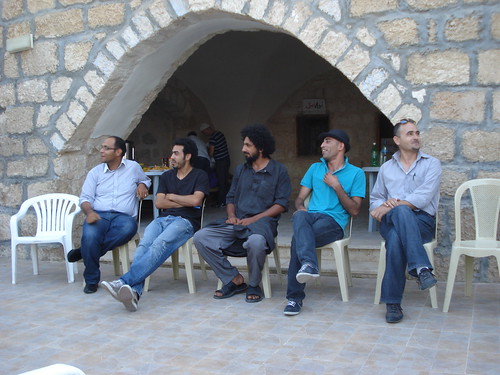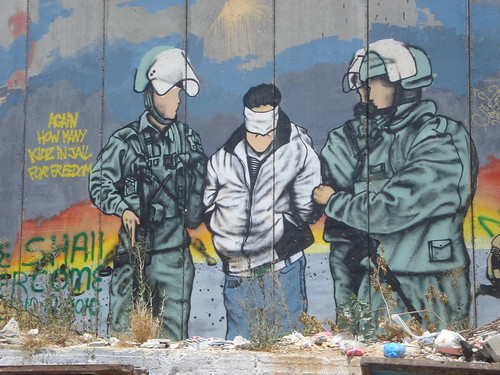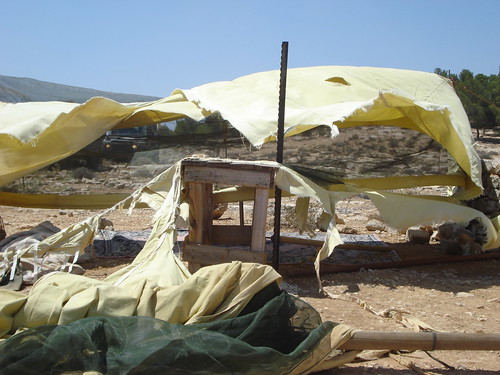This morning at approximately 3:30 a.m. the Israeli Defense Forces surrounded the Freedom Theatre in Jenin, smashed windows, destroyed property, arrested two staff members and held two internationals at gunpoint.
An excerpt from the AIC report
The location manager of The Freedom Theatre, Adnan Naghnaghiye, was arrested and taken away to an unknown location together with Bilal Saadi, a member of the board of The Freedom Theatre. When the general manager of the theatre Jacob Gough from the UK and the co-founder of the theatre Jonatan Stanczak from Sweden arrived to the scene, they were forced at gunpoint to squat next to a family with four small children surrounded by approximately 50 heavily armed Israeli soldiers.
Jonatan says: “Whenever we tried to tell them that they are attacking a cultural venue and arresting members of the theatre we were told to shut up and they threatened to kick us. I tried to contact the civil administration of the army to clarify the matter but the person in charge hung up on me.“
This is exactly the type of unnecessary and mind-boggling violence that occurs on a daily basis and which brings up the many debates surrounding the level and type of resistance necessary in the face of such unrestrained and inexcusable Israeli action.
Last week I posted an article I wrote about the Freedom Theatre while reporting on a discussion held during AIC’s Culture is Resistance! week earlier this month. Five actors from both the Yes Theatre in Hebron and the Freedom Theatre in Jenin discussed the role that theatre plays in resistance. One of the actors had spent seven years as a freedom fighter before joining the Freedom Theatre. At the end of his story, he touched on the issue of resistance saying that for Palestinians, any form of resistance is necessary.
During this same discussion a debate broke out between the men, dividing them between those who did not necessarily support violence, but were not opposed to it and those who were vehemently against it. Both sides included individuals who had fought in the Intifadas.
This is an issue that most internationals and many human rights activists find unsettling. While wholly supportive of the Palestinian cause, they deplore any discussion of violence on the part of Palestinians and are far more sympathetic to Palestinians who embrace nonviolence. In short, they prefer the Martin Luther King Jr. camp to the Malcolm X camp.
I haven’t spoken with anyone who wants to put themselves at risk or be engaged in violent struggle, but it has become clear to me that you can only turn the other cheek so many times before you find yourself spinning in circles. When someone hits you repeatedly, it is not enough simply to raise your arms in defense. The urge to strike back is human and inevitable. You do whatever you think is necessary to make it stop. But is it possible to deplore violence while still accepting that sometimes it is a bitter but necessary part of struggle?
Though it is clear that the Palestinians have little to gain in violent resistance–Israel has the upper hand in every sense of the word– it is exceptionally difficult to compartmentalize resistance into acceptable and unacceptable forms when you are in the midst of it.
The Palestinians do not always have the luxury of a philosophic debate on the subject. They do what anyone in their situation would do, they react in a form that best ensures their survival. Most of what Palestinians do is nonviolent resistance. Their lives are demolished, and they fight back, not by shooting, but by rebuilding.
However you don’t often hear about it. You hear of the rocket attacks, the suicide bombing, the bulldozer attacks. All deplorable, but put within the context of daily home demolitions, unwarranted arrests, vague prison sentences, bombings, checkpoints, humiliation, beatings, and violence coming at you from every side, you begin to see things in a slightly different light. Palestinians do not want violent resistance, but many feel that they are not in a position to exclude it from their struggle.
Every week peaceful demonstrations are held across the West Bank. The IDF fires tear gas canisters, rubber bullets, live ammunition into the crowd. They shove, smack, and arrest protestors. When they respond violently to nonviolent resistance, they provoke a reaction which is then used to justify their force. Nine times out of ten that reaction never happens. Nobody hears about those cases.
They never hear about the Palestinians sitting in jail for months on end for attending a protest against a wall that is illegal by international law. They do not hear about the activists deported and banned from Israel and– consequently the oPt– for years. They do not hear about the daily demolitions nor do they hear about the thousands of Palestinians standing in line for hours at checkpoints waiting for an Israeli soldier to look at their papers and tell them whether or not they can go from one point to another on their own land. They do not hear about the Israeli government suing the impoverished Bedouin communities in the Jordan Valley for the costs incurred when the IDF repeatedly demolishes their homes. They do not hear about the settlers throwing rocks at children or the IDF forcefully defending an illegal outpost that is nothing more than a battered tent set up by settlers to commandeer Palestinian land.
So when a Palestinian says resistance, in any form, is necessary, the international community–including sympathetic supporters–cluck their tongues and immediately take a step back. They want it to be a black and white issue, but given our history of change through revolution, is that realistic? If the opportunity for peaceful resistance is denied, what is the alternative? The issue of resistance is one that is divisive, both within Palestinian society and outside of it. However when nonviolent forms of resistance, such as the Freedom Theatre in Jenin, are attacked and its members arrested and taken to undisclosed locations, the debate is renewed. If Israel will not distinguish between nonviolent and violent resistance, should the Palestinians?
Posted By Nikki Hodgson
Posted Jul 27th, 2011




